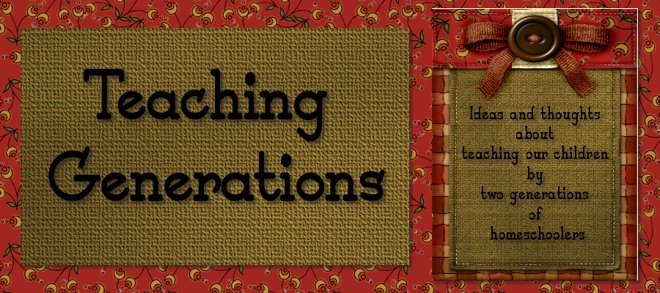This year I have started homeschooling my oldest. She is in Kindergarten. I know we are just starting out, but to me, it is a big deal. I am starting out what I want to do with homeschooling.
I have had to do some real thinking about homeschooling. Yes, I was homeschooled and I liked it. Yes, it seems very natural to me. But yes, homeschooling will be a lot of work! I needed to make sure that I felt like this was the right move for me, my husband and my family. I better really believe in it because it will definitely take enough work and there will be hard times.
As I studied and taught in elementary education, it was so interesting for me to see what public school was like- the good and the bad.
So why am I homeschooling my kids? Is it just because I was homeschooled?
First off, let me answer a few questions...
Do I think public school is bad? No
Do I think children will be ruined if they go to public school? No
Do I think moms that don't homeschool are not good moms? No
Do I secretly think every mom should want to homeschool? No
Should everyone homeschooling? NO!
Are there advantages to public school? Yes
Are there advantages to homeschool? Yes
Here are the reasons why we are homeschooling right now:
-I want to be a part of my children's education. I want to learn along with them and help them develop a love for learning. I want them to view "school" as fun, exciting and an adventure! I want to involve my husband as much as I can.
-We want to build strong family relationships. I feel like I will have more one-on-one time with my children. They play with each other so much and I think that is a good thing :D
-We feel that our children can progress academically if they are taught at their level and at their learning style. I can give my kids so much more instruction at their level than all the hours in school in a day. I can see when I need to slow down and when I need to speed up. One of my daughters only speaks Spanish when we sing, so we sing a lot :) My oldest needs to feel very confident in reading one vowel or set of words before we move to the next level.
-I want my children to have plenty of time to play with friends. I don't want them to be too busy with homework in the afternoon that they can't have unstructured play with friends of all ages! I also love having flexibility to do fun field trips and outings.
-I am used to the idea of homeschooling from the wonderful example of my mother and I love teaching!!!
As they get older, like middle school age, we will probably be homeschooling for other reasons like not wanting them to be exposed to some stuff out there. I don't want them to be super sheltered, but I think it will be okay for them not to see and hear some stuff :)
Am I worried about them being socially awkward? No. I feel like I have no problems making new friends or talking with people. It wasn't hard for me to go to high school or college. I believe that there are lots of weird homeschoolers because their parents don't relate socially very well or they never let their kids play with other kids :) Let's be honest, there needs to be more normal homeschoolers out there!
Are there problems with homeschooling? Yes, but I hope to make up for those problems. I want to give my kids opportunities to work and learn in groups. My husband wants them to learn how to deal with people with a variety of backgrounds. There are other things to consider, but I feel like right now homeschooling is working for our family. I want to evaluate each child as to what would be best for them as we continue homeschooling in the following years.
We're starting a fun adventure right now! Why do you homeschool? Or what do you think is great about homeschooling?
Books are along the wall you can't see :)




























